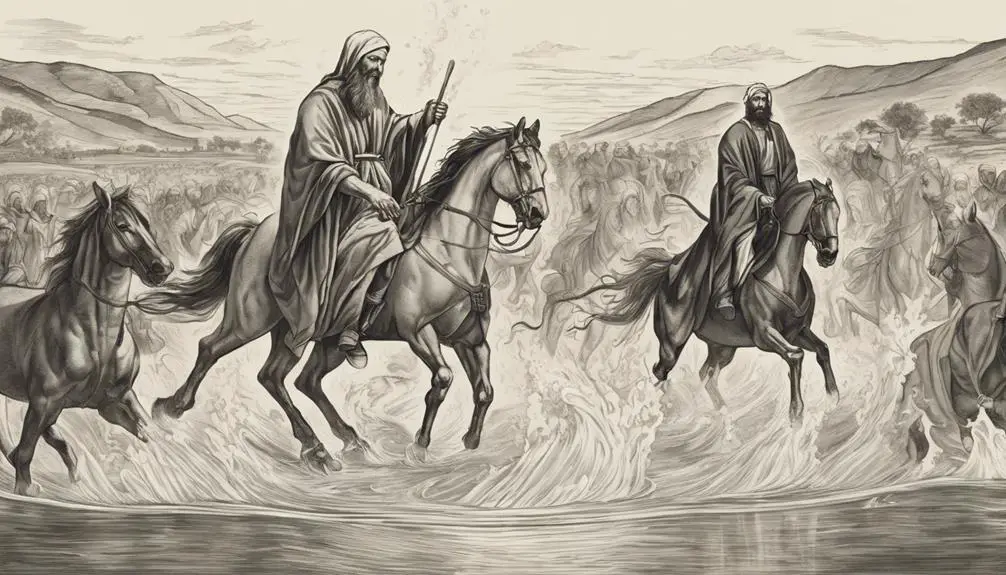Explore timeless mentorship tales in the Bible, revealing secrets to wisdom and leadership that echo through the ages.

Mentoring Examples in the Bible
As you walk through the garden of the Bible, you'll find the trees of mentorship bearing rich fruit in stories that have shaped not just history, but the very fabric of human understanding.
Take, for instance, Moses and Joshua, where the torch of leadership is passed with grace and wisdom, or the profound journey of Elijah and Elisha, showcasing the power of prophetic mentorship. These narratives offer more than just lessons; they provide a blueprint for nurturing growth and passing on valuable life principles.
Wouldn't you be curious to uncover how these timeless mentor-mentee relationships can illuminate your path?
Key Takeaways
- Biblical mentorship examples, like Moses and Joshua, highlight the importance of preparing successors through wisdom and shared experiences.
- Spiritual guidance, as seen in Naomi and Ruth's relationship, can transcend cultural barriers and foster deep personal growth and economic security.
- Successful mentorship involves empowerment and entrusting responsibilities, exemplified by Paul and Timothy's journey in nurturing faithful servitude.
- Legacy and succession in mentorship, demonstrated by Elijah and Elisha, affirm the value of passing on knowledge and authority for continued impact.
Moses and Joshua: A Legacy of Leadership

Moses's mentorship of Joshua stands as a profound example of leadership transition, embodying both guidance and empowerment within the biblical narrative. This relationship showcases mentorship qualities that are essential for effective leadership transition. Moses, aware of his impending departure, prepares Joshua not just by delegating tasks but by instilling in him the wisdom and faith needed to lead the Israelites. This deliberate preparation underlines the importance of mentorship in ensuring continuity and stability.
You'll notice that Moses's approach is characterized by a balance between providing guidance and allowing Joshua the space to grow into his role. This duality in mentorship qualities—offering direction while fostering independence—is critical in leadership transition. It ensures that the mentee is ready to take on leadership challenges with confidence. Moses's method of mentoring Joshua, involving him in decision-making processes and exposing him to leadership responsibilities gradually, is a testament to the effectiveness of mentorship in leadership development.
This biblical example illustrates how mentorship, when executed with foresight and dedication, can facilitate a seamless leadership transition. It emphasizes the mentor's role in equipping their successor with the necessary skills and confidence, thereby ensuring the legacy's continuation.
Elijah and Elisha: The Prophetic Passage

Building on the theme of mentorship within the Bible, the relationship between Elijah and Elisha exemplifies a prophetic passage of wisdom and power from one generation to the next. This mentorship dynamic isn't just about the transfer of knowledge but entails a miraculous succession that signifies God's continuous work through His prophets.
Here are four key aspects to consider:
- Elijah's Role as a Mentor: Elijah, recognized for his unwavering faith and miracles, prepares Elisha, not only through teachings but by demonstrating a life devoted to God's service.
- Elisha's Commitment: Elisha shows unparalleled dedication by leaving his life behind to follow Elijah, symbolizing the depth of commitment required in spiritual mentorship.
- The Chariot of Fire: This dramatic scene marks the culmination of Elijah's earthly ministry and his passing of the mantle to Elisha, illustrating the divine approval and supernatural aspect of their mentor-mentee relationship.
- Miraculous Succession: Elisha's request for a double portion of Elijah's spirit and the subsequent miracles he performs affirm the successful transmission of prophetic power and wisdom.
This story teaches you about the significance of mentorship in fostering the next generation of spiritual leaders, highlighting the necessity of faith, dedication, and divine guidance in the journey.
Naomi and Ruth: Bonds Beyond Blood

The story of Naomi and Ruth showcases a profound example of mentorship that transcends biological ties, emphasizing the strength and loyalty found in chosen family relationships within a spiritual context. This narrative not only highlights cross-cultural relationships but also underscores the importance of economic survival in times of crisis. Through Naomi's guidance, Ruth navigates a foreign culture and secures their livelihood, demonstrating the power of mentorship in overcoming adversity.
Aspect |
Naomi |
Ruth |
|---|---|---|
Guidance |
Spiritual mentor |
Adept learner |
Challenges |
Loss and grief |
Cultural integration |
Solutions |
Leveraging kinship ties |
Embracing new customs |
Outcome |
Economic security |
Strong family bond |
This table encapsulates their journey, reflecting how mentorship facilitated not just survival but also the forging of a resilient, cross-cultural bond. Naomi's mentorship goes beyond traditional roles, instilling in Ruth the values of faithfulness and determination. Together, their story is a testament to the enduring nature of spiritual and emotional bonds, shaped through mentorship, which enable individuals to transcend cultural barriers and economic hardships. Their relationship exemplifies how mentorship can be a beacon of hope and a catalyst for change, reaffirming the essence of chosen familial bonds in the pursuit of a better life.
Paul and Timothy: Nurturing Faithful Servitude

In the narrative of Paul and Timothy, we observe a compelling example of mentorship that molds a foundation of faithful servitude, underscoring the transformative power of spiritual guidance across generations. This relationship serves as a beacon of spiritual fatherhood and dedication, characterized by mutual respect and commitment to the propagation of faith.
Here are four key aspects of their relationship:
- Spiritual Fatherhood: Paul adopts Timothy as his spiritual son, nurturing his faith and guiding him in his spiritual journey. This bond exemplifies the depth of their connection, transcending mere mentorship to a familial level.
- Apostolic Journeys: Together, they embark on numerous apostolic journeys, through which Timothy learns firsthand the challenges and rewards of spreading the gospel. These experiences are instrumental in shaping his ministry and leadership skills.
- Empowerment: Paul empowers Timothy by entrusting him with significant responsibilities, such as leading the Ephesian church. This act of trust reflects Paul's confidence in Timothy's abilities and his readiness to serve.
- Instruction and Encouragement: Through letters, Paul provides Timothy with both instruction and encouragement, addressing his doubts and bolstering his faith. This correspondence highlights the importance of ongoing support and guidance in nurturing faithful servitude.
Jesus and His Disciples: Teaching by Example

Among the most profound examples of mentorship in the Bible, Jesus' relationship with His disciples stands out as a quintessential model of teaching by example, demonstrating how actions often speak louder than words in the journey of faith. You'll notice that through His water-walking faith and parable preaching, Jesus didn't just tell His disciples how to live; He showed them with His life.
Aspect of Mentorship |
Description |
Example in Jesus' Life |
|---|---|---|
Leading by Example |
Jesus embodied the behaviors He wished to instill in His disciples. |
Walking on water to show faith in action. |
Parable Preaching |
He used stories to convey deep spiritual truths. |
Telling parables that reflect the Kingdom of Heaven. |
Compassionate Correction |
Jesus corrected with love, aiming for growth, not shame. |
Gently rebuking Peter's lack of faith. |
Empowering Others |
He equipped His disciples for ministry. |
Sending the 70 out to preach and heal. |
Living Authentically |
Jesus lived what He preached, providing a living example to follow. |
Displaying humility by washing the disciples' feet. |
This table illustrates the multifaceted approach Jesus took to mentorship, emphasizing teaching by example over mere words. Through His actions, He provided a roadmap for living a faithful life, making Him the ultimate mentor in the journey of faith.
Frequently Asked Questions
How Does Modern-Day Mentorship Compare to the Mentor-Mentee Relationships Depicted in the Bible?
Today's mentorship faces modern challenges, like the rise of digital mentorship, which weren't present in past relationships. You're navigating a world where guidance can be both more accessible and more impersonal.
Comparing this to historical mentorships, there's a stark difference in how connections are formed and maintained. Despite these differences, the core goal remains the same: to foster growth and learning, a principle as old as mentorship itself.
Can the Mentoring Examples in the Bible Be Applied to Secular or Non-Religious Contexts?
Absolutely, you can apply biblical mentoring examples to secular contexts. These narratives offer rich insights into cross-cultural mentoring and varied leadership styles, transcending religious boundaries. They provide timeless principles on guidance, support, and development that resonate in any setting.
Are There Any Examples of Female Mentors to Female Mentees in the Bible Outside of Naomi and Ruth?
You'll find examples beyond Naomi and Ruth that embody prophetic guidance and spiritual motherhood. Consider Elizabeth and Mary, where Elizabeth, filled with wisdom, mentors Mary through a pivotal moment.
This relationship showcases spiritual guidance and mutual respect, illustrating how seasoned wisdom aids in navigating life's challenges.
Their bond, deeply rooted in faith, exemplifies a mentorship dynamic rich in support, counsel, and prophetic insight, offering a timeless model for female mentorship.
How Do Cultural and Historical Contexts of the Time Influence the Mentorship Styles Seen in the Bible?
When you explore mentorship in historical texts, it's crucial to consider how cultural interpretation and historical context shape these relationships.
By understanding the societal norms and values of the time, you'll grasp why mentorship styles in ancient writings, particularly those influenced by their era's unique challenges and expectations, appear as they do.
This analysis enriches your appreciation for historical mentorship, illuminating the nuanced ways culture and history intertwine to influence these guiding relationships.
What Are the Psychological Impacts on Mentees When Their Mentors Face Challenges or Failures, as Seen in Biblical Narratives?
When mentors encounter challenges or failures, their mentees often experience significant psychological impacts. You'll find that these situations can foster emotional resilience in you.
Conclusion
In examining these biblical mentoring examples, it's clear that mentorship is a divine tool for growth, leadership, and spiritual nurturing. Moses, Elijah, Naomi, Paul, and Jesus didn't just share knowledge; they invested in relationships that transcended time and circumstance.
Each pair demonstrates that true mentorship involves guidance, patience, and a deep, unselfish desire to see the other flourish. As you reflect on these stories, consider how you're called to mentor or be mentored in your faith journey.



Sign up